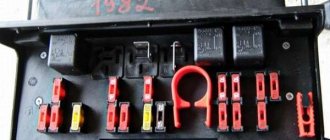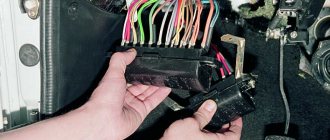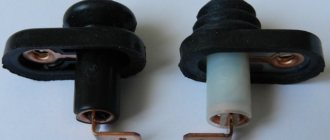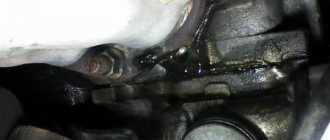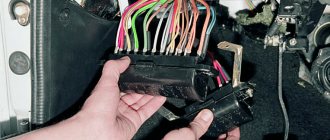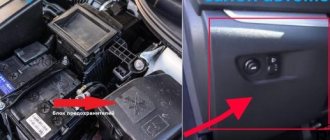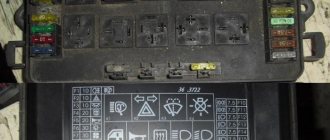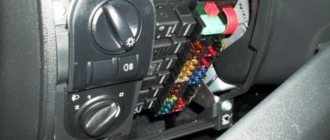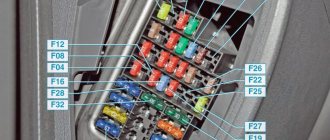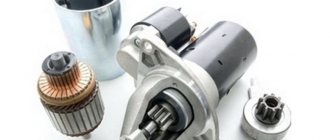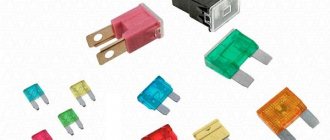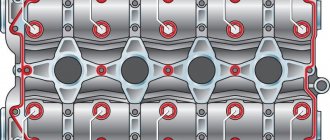Lada Kalina 2 th generation (VAZ-2192, VAZ-2194
) was produced in 2013, 2014, 2015, 2021, 2021 and 2021 with hatchback and station wagon bodies in both standard versions, as well as all road versions of Cross and sports versions - Sport. In this publication you will find a description of fuses and relays of the 2nd generation Lada Kalina with block diagrams and photos - examples of execution. Let's highlight the fuse responsible for the cigarette lighter. In conclusion, we will offer complete electrical diagrams of Kalina 2 for download.
The execution of the block diagrams and the purpose of the elements in them may differ from those presented and depend on the year of manufacture and the level of equipment of your Kalina 2 car (luxury, standard, norm). Check the description with yours, printed on the back of the protective cover or other technical documentation.
Block in the cabin
The main fuse and relay box is located in the passenger compartment, under the instrument panel on the driver's side, behind the protective cover.
Option 1
Photo
Scheme 1
Scheme 2
Description of fuses
| F1 | 15A Ignition coils, Injectors, Engine control system controller |
| F2 | 25A Norma, Lux: Central body electronics unit, Driver's door module Standard: Daytime running lights |
| F3 | 15A Normal, Lux: Automatic gearbox control controller, Automatic gearbox control drive Standard: Hazard alarm |
| F4 | 15A Airbag system controller |
| F5 | 7.5A Terminal 15 devices |
| F6 | 7.5A Reversing light, direction indicators (Standard) Automatic transmission control controller (Normal, Luxury) Safe parking system control unit (Normal, Luxury) |
| F7 | 7.5A Canister purge valve Mass air flow sensor/pressure sensor Phase sensor Oxygen concentration sensors |
| F8 | 25A Rear window heater, Heated exterior mirrors (Normal, Lux) |
| F9 | 5A Starboard side marker lights |
| F10 | 5A Side lights on the left side Illumination of instruments and keys License plate lights Luggage compartment light Glove box light |
| F11 | 5A Rear fog lights |
| F12 | 10A Low beam, right headlight Electrical corrector of the right headlight |
| F13 | 10A Low beam, left headlight Electro corrector for left headlight |
| F14 | 10A High beam, right headlight |
| F15 | 10A High beam, left headlight |
| F16 | 10A Right fog lamp |
| F17 | 10A Left fog lamp |
| F18 | 20A Front seat heaters, Cigarette lighter |
| F19 | 5A Norm, Lux: ABS control unit 20A Standard: Door locking gearmotors |
| F20 | 15A Horn |
| F21 | 10A Fuel Pump |
| F22 | 25A Windshield washer Central body electronics unit Rear window washer Rear window wiper |
| F23 | 5A Instrument cluster Diagnostic connector |
| F24 | 7.5A Normal, Lux: Air conditioning compressor clutch Controller of the automatic climate control system Standard: Reserve |
| F25 | 7.5A Brake lights Interior lighting (Standard) |
| F26 | 10A Norm, Lux: Central body electronics unit Standard: Reserve |
| F27 F31 | 25A Normal, Lux: ABS control unit 30A Standard: Electric windows for front doors |
| F28 F32 | 30A Electric heater fan (Standard) Automatic climate control system controller |
Fuse number 18 at 15A is responsible for the cigarette lighter.
Relay purpose
| K1 | Radiator cooling fan relay |
| K2 | Radiator cooling fan relay |
| K3 | Additional starter relay |
| K4 | Ignition switch unloading relay |
| K5 | Alarm relay |
| K6 | Heated Seat Relay / Wiper Relay |
| K7 | High beam relay |
| K8 | Horn relay |
| K9 | Low beam relay |
| K10 | Relay for heated rear window and exterior mirrors |
| K11 | ECM main relay |
| K12 | Fuel pump relay |
| K13 | Reverse light relay |
| K14 | Radiator cooling fan relay |
| K15 | Heated windshield relay |
| K16 | Heated windshield relay |
| K17 | A/C compressor clutch relay |
Option 2
Scheme
General designation of elements
Explanation of fuses
| F1 | 15A Ignition coils, Injectors, Engine control system controller |
| F2 | 30A Norma, Lux: Central body electronics unit, Driver's door module Standard: Daytime running lights |
| F3 | 15A Norma, Lux: Automatic gearbox control controller, Automatic gearbox control drive |
| F3 | 10A Standard: Alarm |
| F4 | 15A Airbag system controller |
| F5 | 7.5A Terminal 15 devices |
| F6 | 7.5A Reverse light, Automatic gearbox control controller ( Normal, Lux ) |
| F7 | 7.5A Canister purge valve, Mass air flow sensor/pressure sensor, Phase sensor, Oxygen concentration sensors |
| F8 | 7.5A Standard: Turn indicators Norm, Lux: Reserve |
| F9 | 5A Starboard side marker lights |
| F10 | 5A Left side parking lights, Instrument and key lighting, License plate lights, Trunk light, Glove box light |
| F11 | 5A Rear fog lights |
| F12 | 10A Low beam, right headlight, Electrical corrector for right headlight |
| F13 | 10A Low beam, left headlight, Electrical corrector for left headlight |
| F14 | 15A Cigarette lighter in trunk |
| F15 | 10A Rear window wiper, Rear window washer |
| F16 | 5A Norm, Lux: Driver's door module, Standard: Reserve |
| F17 | Reserve |
| F18 | Reserve |
| F19 | 20A Standard: Door lock, Normal, Lux: Reserve |
| F20 | Reserve |
| F21 | 10A High beam, right headlight |
| F22 | 10A High beam, left headlight |
| F23 | 10A Norma, Lux: Right fog lamp Standard: Reserve |
| F24 | 10A Norma, Lux: Left fog lamp Standard: Reserve |
| F25 | 15A Heated front seats |
| F26 | 5A ABS control unit |
| F27 | 15A Cigarette lighter |
| F28 | 15A Fuel pump |
| F29 | 20A Central body electronics unit ( Normal, Luxury ) Windshield wiper, Windshield washer |
| F30 | Reserve |
| F31 | 7.5A Normal, Standard: Air conditioning compressor clutch, Automatic climate control system controller Standard: Reserve |
| F32 | 7.5A Brake signal, Interior lamp |
| F33 | 25A ABS control unit |
| F34 | 5A Instrument cluster, Diagnostic connector |
| F35 | 10A Norm, Lux: Central body electronics unit Standard: Reserve |
| F36 | 10A Horn |
| F37 | 10A Multimedia system |
| F38 | Reserve |
| F39 | Reserve |
| F40 | Reserve |
| F41 | Reserve |
| F42 | 30A Standard: Electric windows Norm, Lux: Reserve |
| F43 | 50A Norm, Lux: AMT controller Standard: Reserve |
| F44 | 30A Electric heater fan, Automatic climate control system controller (Normal, Lux) |
| F45 | 25A Rear window defroster |
| F46 | Reserve |
Fuse number 27 at 15A is responsible for the cigarette lighter.
Relay description
| K1 | Ignition switch unloading relay |
| K2 | Starter relay |
| K3 | Standard, Lux: Radiator cooling fan relay Standard: Windshield wiper relay |
| K4 | Radiator cooling fan relay |
| K5 | Standard, Lux: Air conditioning compressor clutch relay Standard: Turn signal and hazard warning relay |
| K6 | Standard, Luxury: Relay for heated rear window Standard: Relay for front electric windows |
| K7 | High beam relay |
| K8 | Horn relay |
| K9 | Low beam relay |
| K10 | Norma, Lux: Reversing light relay (in configurations with automatic transmission) Standard: Reserve |
| K11 | ECM main relay |
| K12 | Fuel pump relay |
| K13 | Seat heating relay |
| K14 | Standard, Lux: Heated windshield relay Standard: Hazard warning relay |
| K15 | Standard: Rear window defroster relay |
| K16 | Standard: Additional alarm relay |
List of contact relays
If we open the main fuse box of Kalina 2, we will see a set of electrical relay housings. There are no other blocks containing relays in the car. We list the elements used in the “Lux” package (21927/21947):
- K1: radiator fan relay;
- K2: relay switching on door locks;
- K3: additional starter relay;
- K4: additional relay (switches current 50A);
- K6: wiper relay;
- K7: relay that turns on the high beam;
- K8: signal relay;
- K9: relay that turns on the low beam;
- K10: rear window heater relay;
- K11: main ignition relay;
- K12: relay turning on the fuel pump;
- K13: additional relay;
- K14: radiator fan relay 3;
- K15: windshield heater relay 1;
- K16: windshield heater relay 2;
- K17: relay that turns on the air conditioning compressor.
The pliers that you will find in the Kalina 2 fuse box will be of two types. “Large” ones are intended for dismantling relays K1-K6, as well as K13-K17.
You can compare the layout of elements in “Lux” and in “Norm/Standard”:
This is how the relays are located in different configurations, 21927 and 21925
Let's consider the data relevant for the “Normal/Standard” configurations:
- K1-K12: as above;
- K13: radiator fan relay 3;
- K14: windshield heater relay 1;
- K15: windshield heater relay 2;
- K16: air conditioning compressor relay.
The last list is also relevant for Kalina Cross Norma. And in more expensive trim levels of the crossover, the “Lux” scheme will probably be used.
Block under the hood
It is located next to the battery.
Photo - diagram
Purpose
- 30A Low beam headlights or main relay, circuits protected by fuses F1 and F21 of the mounting block in the passenger compartment 50A Windshield heater
- 60A Generator
- 60A Generator
- 30/40A Heater fan (heater fuse grants)
- 50A Electromechanical power steering
- 60A ABS block
What is the Kalina fuse diagram
Any owner of a Lada Kalina Cross car has had problems with electrical equipment, namely with fuses. Alas, not everyone has a manual that describes their purpose. That is why we have prepared this small fuse diagram guide.
The symbols F1-F31 indicate fuses, K1-K6 are the locations of large relays, and K7-K12 are the locations of small relays.
Note that powerful equipment that consumes current, for example, an electric washer motor, window lifts, and others, are connected through a relay.
More than half is located in the cabin, namely in the relay and fuse box.
Guide to replacing the fuse box on Lada Kalina, explanation
The Lada Kalina has earned a reputation as a comfortable and reliable car. But, like all vehicles, it is not immune to various types of breakdowns. Quite often one or another electrical equipment fails. Some breakdowns are not critical, for example, the cigarette lighter does not work, but there are also those that can completely render your vehicle immobile.
This is, first of all, the failure of such an important component as the fuel pump. It is not always necessary to change the consumer in order to restore its functionality; very often it is enough to replace the fuse and the relay responsible for it to restore its functionality.
Car Lada Kalina
Let's say right away that on the Lada Kalina car the electrical circuits are protected by electrical fuses and relays located in several compartments. For example, the fuse for the cigarette lighter is located in the main compartment under the panel, and the fuel pump is located in the additional compartment.
All blocks with electrical fuses are installed in easily accessible and convenient places, so changing and checking protective elements will not cause difficulties even for a novice car enthusiast.
Where is the fuse box?
The largest compartment, which houses most of the fuses and relays, is located on the left side of the instrument panel and is covered with a cover. The second, in which the elements responsible for the power unit control systems are located, is located in the lining of the floor tunnel. This is where the fuel pump fuse is located.
Location of the fuse and relay box on the Lada Kalina
Removal and replacement instructions
Replacing and identifying an unusable element in both the first and second blocks occurs in approximately the same way, so let’s consider the replacement process using the example of the one installed to the left of the dashboard.
Diagram on the back of the cover
Preparation
Be sure to remember that before you carry out work on electrical equipment, it doesn’t matter whether the cigarette lighter or the fuel pump has failed, the first thing you need to do is turn off the power to the system. To do this, turn off the engine and remove the negative terminal of the battery.
This video shows how you can quickly solve a problem with blown fuses on a Lada Kalina.
- We find the location of the block, it’s not difficult - the designers placed it on the left side of the dashboard under the cover.
- Open the lid.
- Using the diagram and table, we establish the location of the protective element we need.
- The block contains tweezers, with the help of which we extract the required element.
- Let's examine it.
- We check with an ohmmeter or lamp.
- If the spiral is burnt out, install a new one of equal value.
- We connect the removed battery terminal.
- We start the car.
- Let's see whether our consumer has earned money or not.
- If everything is in order, then the work is finished. If the consumer does not work or the electrical fuse has blown again, then everything is more serious. It may be necessary to check the circuit or dismantle the consumer and check it.
Layout of relays and electrical fuses
Explanation of the diagram shown in the photo.
The request returned an empty result.
Work with the block, which contains the element protecting the fuel pump and other elements responsible for the operation of the engine, is carried out in a similar way.
The request returned an empty result.
The protective element designed for 15 amperes, responsible for the fuel pump of the Lada Kalina, is designated F2 in the photo. To remove it, you need tweezers. All other work is carried out in the same way as in the large compartment.
Replacing the fine fuel filter
The fuel pump on the Lada Granta does not work. How to replace the fuel filter on a Lada Kalina with your own hands. installing a new fuel pump strainer
To remove the old filter, you need clear access to the rear of the car. To do this, it should be driven into a viewing hole or overpass. In addition to the tool used to replace the mesh, you will need a small container to drain the fuel.
The procedure for replacing FTO is as follows.
- The pressure is released through a valve on the ramp or by starting the engine with the fuel pump fuse removed.
- Under the car, the wire clamp on the return fitting (located on the right) is released.
Then the hose is removed and directed into a previously placed container. To remove the tube from the fitting, you need to slightly bend the clamp - After draining the fuel, the operation is repeated on the supply hose. As a result, 150-300 ml of gasoline should drain out.
- The nut of the fastening clamp is loosened and the filter housing is pulled out.
In this case, you need to remember the direction of the arrow on the filter. To remove the FTO, you need to loosen the fastening clamp. - The new filter is installed taking into account the direction of fuel movement. Wire clips snap into place on the hoses that are put on.
After replacement, the operation of the filter under pressure is checked. To do this, the ignition is turned on and the fuel lines are checked for leaks. Then the verification is repeated with the car running. The replacement algorithm does not depend on the number of engine valves.
